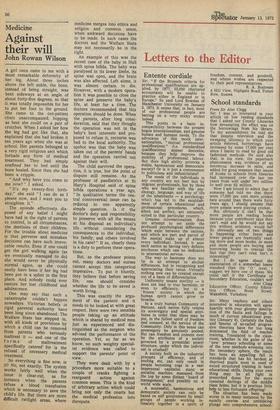Entente cordiale
Sir: " If the Brussels criteria for professional qualifications are applied, by 1977, 55,000 chartered accountants will be unable to practice either in England or in Europe." So said Lord Bowden of Manchester University on January 5, 1973. It seems that, in fact, most of our professional people are batting on a very sticky wicket indeed.
This points to a basic incompatibility between the present bogus internationalism, and genuine human and humane needs. To the advocates of this mock internationalism, "mutual professional qualifications " (i.e. standardised qualifications) appear desirable, because they help improve the mobility of professional labour. But does high ability promote a stable, harmonious and democratic society? Or is it just a convenience to politicians and industrialists?
The needs of the individuals in any country are not best met by migrant professionals, but by those who are familiar with the psychology, language, and way of life of the inhabitants — a psychology which has led to the establishment of certain educational and professional procedures, which, albeit not perfect, are eminently suited to that particular country.
Genuine internationalism does not attempt to set aside the profound psychological differences which exist between the nations, and which are part and parcel of the mental make up of almost every individual. Instead, it sees each nation as having very definite attributes which can be dedicated to international service.
The way to harmony does not lie in an attempt to abolish differences, but in recognising and appreciating their value. Virtually nothing new can be created except out of a basis of differentiation.
Uniformity means sterility — it does not lead to true harmony, or even to efficiency, but to a ' frozen ' society in which the human spirit cannot grow or breathe.
In a truly human Community of Nations, each nation fully retains its sovereignty and special attri butes in order that these may be put, in the fullest spirit of freedom
and consent, at the service of the Community. Only in this sense can sovereignty be genuinely pooled.
But can freedom and consent ever be the attributes of a society governed by a pyramidal power structure, under which the individual is crushed?
A society built on the industrial precepts of efficiency, and of pooling etc, can only result in
people becoming cogs in a vast impersonal capitalist state; or socialist machine, managed from the top by some distant 'board of management,' and possibly on a world wide scale.
A successful, harmonious and democratic society can only be based on self government by small groups of people working intimately together in a spirit of freedom, consent, and goodwill, and whose wishes are respected by their paid representatives.
R. A. Boatman 4 Hill View, Highgate Road, Forest Row, Sussex
School standards


































 Previous page
Previous page